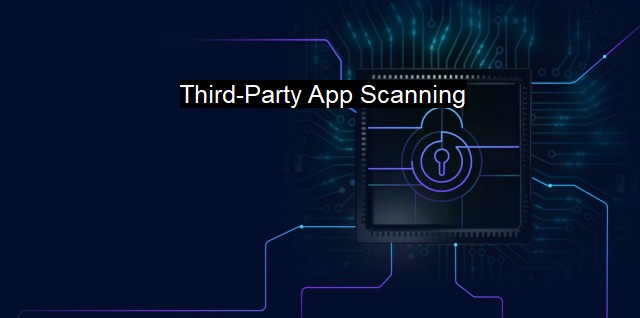What is Third-Party App Scanning?
The Risks of Third-Party Applications: The Importance of Third-Party App Scanning in Terms of Cybersecurity
In the complex realm of cybersecurity, one practice plays a critical role in protecting your computing and smartphone platforms—third-party app scanning. It's a significant aspect of antivirus technology and refers to software security programs 'scanning' third-party applications for malicious activity or intents. Third-party app scanning adds an extra shield against cyber threats and malicious actors, ensuring that confidential data remains highly secure.So, what makes an app a 'third-party'? In most cases, third-party apps refer to those not developed by the device's manufacturer. Such apps may be widely used despite their origin from an independent developer or entity rather than those affiliated with the device's original operating system. apps downloaded from Google Play Store onto Android phones or from Apple's App Store onto iPhones are considered third-party apps.
Although such apps expand the capabilities of smartphones or computing devices, some may come with some risk. This is due to varying security assurance, as not all third-party developers might adhere to the robust security practices mandatory for the platform providers. Some apps may even be deliberately malicious, designed to infiltrate devices to steal data or engage in malicious activity, which introduces the need for third-party app scanning.
Third-party app scanning involves probing these applications for possible harmful behavior. This might include checking for undefended data transmission, for weaknesses that a hacker might exploit to access data, or for code that signifies malicious intents, such as viruses or trojan horses. Some third-party app scanners also seek out behavioral anomalies, like third-party apps that ask for unnecessary permissions or share more data than required.
Antivirus software often comes equipped with this scanning technology which can automatically check downloaded apps for potential threats. The scanner can vet the reputation of the app, the necessity for the permissions it asks for, and the security of the data transmission. It's worth mentioning that although most app stores incorporate some level of security checks before hosting an application, these are not foolproof, requiring the end-user to participate in the security framework actively.
As technology advances and artificial intelligence becomes more integrated into cybersecurity tools, third-party app scanning will likely become even more intricate. These AI-enhanced scanners may have the capability to analyze patterns and behaviors in apps with a kind of intuitive understanding previously impossible, adapting in real-time to zero-day threats and ever-evolving malware techniques.
Third-party app scanning also carries relevance in the corporate world where employees using their personal devices could unintentionally introduce security threats. By actively incorporating third-party app scanning into their cybersecurity policy, businesses can scan these devices for such risks, maintaining their network and data integrity.
Notwithstanding, while this approach is an essential layer of protection, it's important to recognize that it doesn't negate the need for other cybersecurity practices. Regular updating of software, mindful management of permissions, secure browsing habits, and knowledgeable handling of phishing threats all act in harmony with third-party app scanning to embed robust, multi-dimensional security.
Third-party app scanning is a valuable line of defense in the wide-ranging field of cybersecurity. It offers a way to mitigate the inherent risks of third-party applications and contributes to making our digital experience a safer one. As cybersecurity threats continue to grow and evolve, so too will the defenses against them, with third-party app scanning being integral to this ever-important battlefront.

Third-Party App Scanning FAQs
What is third-party app scanning?
Third-party app scanning is a process of analyzing and assessing the security risks associated with the use of third-party applications that are installed on a computer system. This helps to identify any vulnerabilities and reduce the risk of cyber attacks.Why is third-party app scanning important?
Third-party app scanning is important because many cyber attacks are initiated through vulnerabilities in third-party applications. By scanning these applications, any security risks can be identified and addressed before they can be exploited by hackers.What types of threats can be identified through third-party app scanning?
Third-party app scanning can identify various types of threats such as malware, viruses, adware, spyware, and other types of malicious software that can compromise the security of a computer system.How often should third-party app scanning be performed?
Third-party app scanning should be performed regularly, ideally on a weekly basis, to ensure that any new vulnerabilities or threats are identified promptly. It is important to keep all third-party applications up-to-date with the latest security patches and updates to minimize the risk of cyber attacks.| | A | | | B | | | C | | | D | | | E | | | F | | | G | | | H | | | I | | | J | | | K | | | L | | | M | |
| | N | | | O | | | P | | | Q | | | R | | | S | | | T | | | U | | | V | | | W | | | X | | | Y | | | Z | |
| | 1 | | | 2 | | | 3 | | | 4 | | | 7 | | | 8 | | |||||||